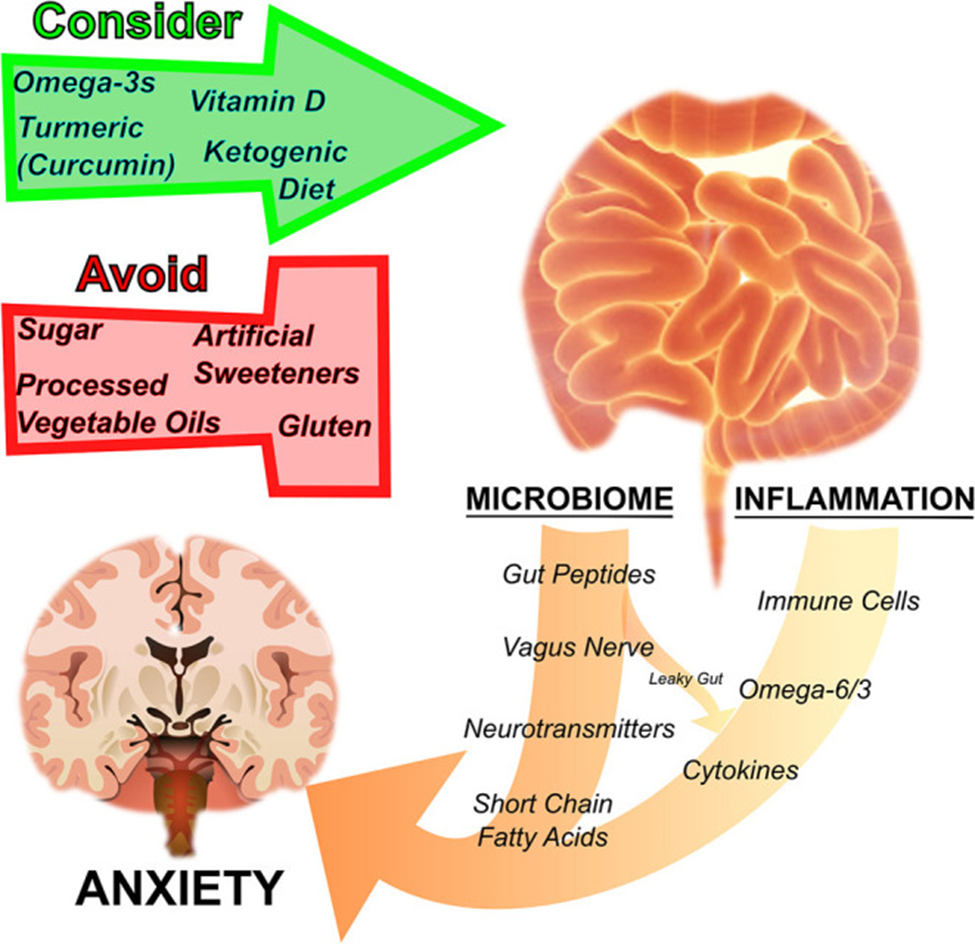Anxiety disorders are prevalent in modern society, but medications and psychotherapy often fail to fully resolve symptoms. Nutrition interventions may help address the underlying metabolic pathologies associated with anxiety.
These include avoiding artificial sweeteners and gluten, supplementing with vitamin D, and including omega-3 fatty acids and turmeric in the diet.
Drs. Naidoo and Norwitz walk us through some nutritional approaches to keep anxiety at bay.
The Gut Microbiome
- The gut microbiome can impact mental health by communicating with the brain via the vagus/vagal nerve, regulating hormones, and influencing inflammation.
- The composition of an individual's gut microbial ecosystem can regulate mental status and anxiety, and microbiome dysbiosis is associated with anxiety.
- Food influences the microbiome, and microbe-derived short-chain fatty acids bind to receptors on enteroendocrine cells to regulate the secretion of gut peptides, which themselves bind to receptors on the amygdala to influence the stress response and anxiety.
Inflammation
- Chronic inflammation is commonly found in neurological and neurodegenerative disorders, including anxiety.
- People with anxiety disorders often show elevated levels of inflammatory markers, such as C-reactive protein and cytokines.
- Sugar and processed vegetable oils, which are associated with the Standard American Diet, are known to contribute to inflammation and should be replaced with whole foods for better physical, cognitive, and mental health.
Artificial Sweeteners
- Artificial sweeteners have been shown to contribute to anxiety by impacting the microbiome and inflammation, as well as blocking the transport of neurotransmitters to the brain.
- Studies have shown that individuals with mental disorders may be more susceptible to the adverse effects of artificial sweeteners.
- For those who refuse to give up sweeteners, natural non-caloric and non-insulinogenic sweeteners like stevia may be a safer alternative to recommend.
Gluten
- Gluten can cause inflammation by increasing gut permeability, and immune-stimulating compounds can leak into the bloodstream and lead to inflammation.
- Zonulin, a protein that regulates gut permeability, is linked to mental illnesses, including anxiety.
- Although a gluten-free diet has only been shown to decrease anxiety in celiac patients, a gluten-free diet can be considered a metabolic treatment for anxiety due to the mechanistic link between gluten and "leaky gut."
Omega-3 Fatty Acids
Omega-3 fatty acids, particularly EPA and DHA, are anti-inflammatory signaling molecules that support the microbiome and are important in cognition and mental health. Human studies have shown an inverse correlation between erythrocyte EPA and DHA levels and the severity of anxiety. Randomized, double-blinded, placebo-controlled trials have demonstrated that omega-3 supplementation lowers anxiety, with doses of at least 2 grams per day being effective. Fatty fish, such as salmon, are rich sources of EPA and DHA, while plant sources, such as flax seeds and chia seeds, contain primarily ALA, a shorter chain omega-3 that is converted to EPA and DHA only at very low levels.
Turmeric (Curcumin)
- Turmeric contains an active compound called curcumin, which has been studied for its potential benefits in treating brain health issues such as Alzheimer's, Parkinson's, depression, and anxiety.
- Curcumin has been shown to improve gut health, reduce inflammation, and alter neurotransmitter levels.
- Preclinical trials on animals have demonstrated curcumin's anti-anxiety effects, while human trials have also shown that curcumin supplementation can reduce anxiety.
- However, there are challenges in the curcumin literature due to its chemical instability and low bioavailability, which may affect the reproducibility of studies.
Vitamin D
- Vitamin D is important for overall health and regulating calcium homeostasis, neurotransmitter levels, and inflammation in the brain.
- Many modern humans do not get enough vitamin D from sun exposure or diet, and low vitamin D levels have been associated with mental disorders including anxiety.
- Vitamin D supplementation has been shown to improve anxiety symptoms in those with vitamin D insufficiency.
- Supplementation should be considered for patients with anxiety as many will be vitamin D insufficient, and the positive effects on patient health are likely.
Ketogenic Diets
- Ketogenic diets are high-fat, low-carbohydrate diets that induce the body to produce ketones, a fuel source for the brain.
- They have been gaining popularity as a metabolic treatment for a wide range of chronic metabolic diseases and have been used for a century to treat drug-resistant pediatric epilepsy.
- Ketogenic diets help to address many of the biopathological foundations of chronic neurological diseases and mental illnesses, including glucose hypometabolism, neurotransmitter imbalances, oxidative stress, and inflammation.
- No clinical trials assessing the efficacy of ketogenic diets for anxiety have yet been conducted and further research is needed.
Additional nutrition strategies that could help in treating anxiety disorders include reducing caffeine intake, taking prebiotics and probiotics to support gut health, and supplementing with magnesium or tryptophan to increase serotonin synthesis.
Nutritional psychiatry is an emerging field, and more research is needed, but it may offer a low-risk and potentially high-yield approach to treating anxiety.

Source: Norwitz, Nicholas G, and Uma Naidoo. “Nutrition as Metabolic Treatment for Anxiety.” Frontiers in psychiatry vol. 12 598119. 12 Feb. 2021, doi:10.3389/fpsyt.2021.598119 This is an open-access article distributed under the terms of the Creative Commons Attribution License (CC BY)
Reference
Norwitz, Nicholas G, and Uma Naidoo. “Nutrition as Metabolic Treatment for Anxiety.” Frontiers in psychiatry vol. 12 598119. 12 Feb. 2021, doi:10.3389/fpsyt.2021.598119 This is an open-access article distributed under the terms of the Creative Commons Attribution License (CC BY).
